Truckbusters From Dogpatch…and Baited Trap, the Ambush of Mission 1890 began with Jacksonville University
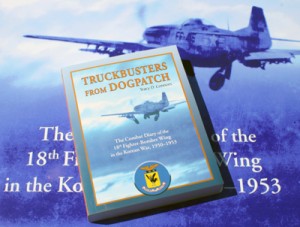 The recently published Truckbusters From Dogpatch: The Combat Diary of the 18th Fighter-Bomber Wing in the Korean War, 1950-1953, is perhaps the largest unit history ever published on the so-called “Forgotten War.”
The recently published Truckbusters From Dogpatch: The Combat Diary of the 18th Fighter-Bomber Wing in the Korean War, 1950-1953, is perhaps the largest unit history ever published on the so-called “Forgotten War.”
It also has very special significance for Jacksonville University.
The story of a book that one reviewer said he “thought would never be written and that, in fact, could not be written,” begins more than fifty-seven years ago at Jacksonville Junior College.
It took JU Alumnus retired Navy Captain Tracy D. Connors over five years to research and write the remarkable, 712-page, true-life account of the U.S. Air Force’s 18th Wing from 1950 to 1953, the time during which their heroic air-combat efforts flying F-51 “Mustang” fighter-bombers helped save South Korea from occupation by North Korean and Chinese military forces.
Captain Connors, now a Gainesville resident, has previously published 14 management handbooks for not-for-profit organizations.
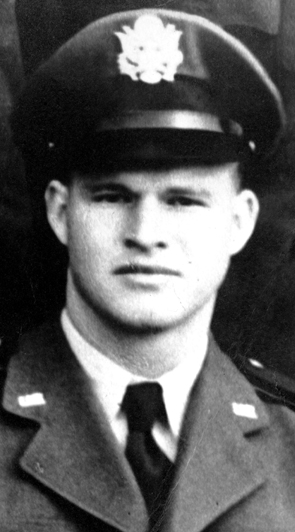
“I wanted Truckbusters to become for the reader a gritty, dusty, tent city full of the sounds, smells and character of those who served with the 18th in Korea—pilots, ammorers, mechanics, clerks, medics, and supply sergeants—who still, live and speak and fret and worry about how to keep that venerable, but out-dated F-51 Mustang “Spam Can” flying,” he explained.
Truckbusters is dedicated to 1st Lt. Archibald “Archie” Connors, President of the JJC Student Council in 1948-49, and CAPT Connors’ uncle–“more like my older brother,” he explained.
After attending Robert E. Lee High School, serving briefly in the U.S. Navy during WWII, and graduating from JJC as a pre-law student, Connors completed flight training as a U.S. Air Force pilot. He was posted to Korea and the 67th Fighter-Bomber Squadron (a component of the 18th F-B Wing), in late 1951.
During a daring rescue mission into the so-called “Iron Triangle” on 25 June 1952, Lt. Connors was killed in action.
CAPT Connors’ determination to learn the details of his uncle’s last mission, grew into a comprehensive history of the 18 th Wing during the Korean War.
A Truckbuster’s section entitled “Into the Iron Triangle,” describes the compelling story of Lt. Connors’ final mission, the Korean War’s most deadly helicopter rescue mission.
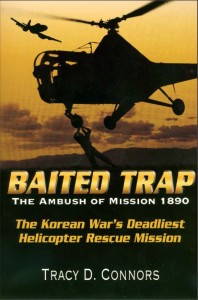 A more recent book, Baited Trap, the Ambush of Mission 1890, the Korean War’s deadliest helicopter rescue mission, tells the complete story of the most heroic—and costly—air rescue of the Korean War. This harrowing Air Force-Navy mission is explained and illustrated in compelling detail, creating a inique personal account of what five incredibly brave and determined Air Force and Navy airmen achieved on June 25, 1952 in the infamous “Iron Triangle.”
A more recent book, Baited Trap, the Ambush of Mission 1890, the Korean War’s deadliest helicopter rescue mission, tells the complete story of the most heroic—and costly—air rescue of the Korean War. This harrowing Air Force-Navy mission is explained and illustrated in compelling detail, creating a inique personal account of what five incredibly brave and determined Air Force and Navy airmen achieved on June 25, 1952 in the infamous “Iron Triangle.”
Using declassified official records, extensive research, tracking down the scattered families of heroic airmen, and the Freedom of Information Act, CAPT Connors pieced together the story of what five incredibly brave and determined Air Force and Navy pilots did that long June afternoon.
After three costly attempts to pluck a downed Navy Ensign off the side of a heavily defended mountainside, the helicopter and its escorting Mustang fighter-bombers were successful in rescueing the young pilot. Several miles away however, enemy fire brought down the helicopter. Two of three airmen aboard were killed. Lt. Connors was shot down and killed several minutes later as he made a low level pass over the downed helicopter attempting to provide further protection. One crewman survived 14 months as POW.
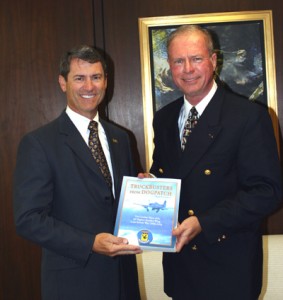
Later, the 18th’s unrelenting interdiction played a key role in bringing about the Armistice that reestablished the nation of South Korea.
The 18th Wing flew more combat missions that any other unit in the Korean War, and one of its squadron commanders was posthumously awarded the Congressional Medal of Honor, one of only four such awards to Air Force personnel during that war.
The Wing’s integrity, professionalism and dedication also contributed significantly to the fledgling Air Force core values so often cited these days, Connors explained.
Connors believes strongly that Truckbusters as a story of an embattled American military unit that worked through enormous challenges to achieve military success “is highly relevant to all Americans today.
The Korean War is called by some Americans ‘the Forgotten War.’ But not by millions of South Koreans who regained their freedoms, self-determination and future. It’s not called that by the families and friends of those who fought, bled and died there. And, it should not be forgotten by those today who understand the on-going importance of what was achieved by those who struggled there. Our nation owes those who served in Korea a significant debt of gratitude for what they did to protect Freedom. Their deeds and achievements continue to shape the world over half a century later,” he emphasized.
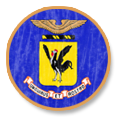 Truckbusters
Truckbusters